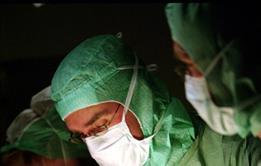The annual health check reveals a stronger performance by primary care trusts, but provides worrying signs that improvement in acute trusts has stalled.
The 2008-09 assessment published by the Care Quality Commission rates only 37 acute trusts as excellent, compared with 52 last year, and there was a sharp drop in compliance with government standards.
The health check results show the vertiginous climb the NHS has to make if it is to come anywhere close to maintaining service standards
There are unquestionably some stunning successes in there. The Royal Marsden Foundation Trust in London showed why it is internationally renowned for its cancer care, while Homerton University Hospital and Rotherham foundation trusts both demonstrated how to provide excellent healthcare for deprived communities.
But the acute results as a whole are going backwards.
The difficulty is discerning what is going wrong. It is fair to accept that some of the deterioration is down to more honest self-assessment. For example, soul-searching in the aftermath of the Baby P scandal may account for a decline in the scores for safeguarding children.
But it is hard to understand why there has been a drop in something as fundamental as decontamination.
Similarly, any managers overseeing a service which is condemning people to avoidable disability because their hospital has still not got its act together on stroke care might want to consider whether it is time to pursue a new career.
There is a serious risk the scores will drop further over the next two years. The CQC has promised a tougher test next year, while the 2010-11 results will show the pain of cuts.
The abolition of targets proposed by the Conservatives could further exacerbate the problem by allowing spiralling waiting lists. Technical changes such as modifications to the tariff will also increase the risks of trusts getting into difficulty.
This is not how it was supposed to be.
The health check results show the vertiginous climb the NHS has to make if it is to come anywhere close to maintaining service standards as the funding is cut. While the stars in the healthcare firmament certainly shine out from these scores, there are still too many black holes.
Health check improvements mask decline in acute trust performance

The performance of acute trusts in the annual health check has dropped for the first time despite overall improvements in service quality across the NHS.
- 1
- 2
- 3
- 4
 Currently
reading
Currently
reading
Stars of the health check ratings must not be eclipsed by failures
- 6






































1 Readers' comment